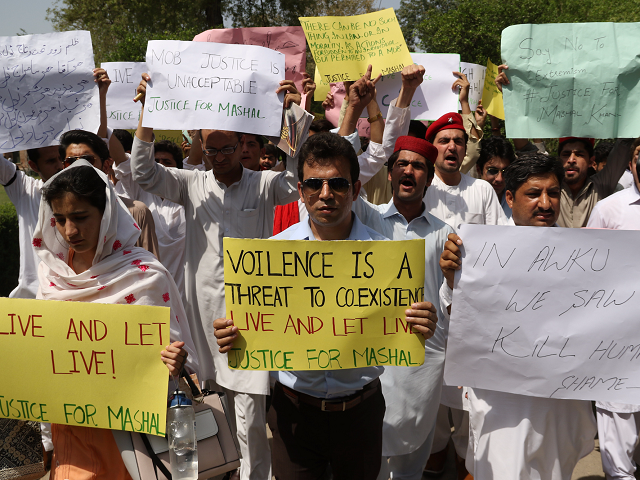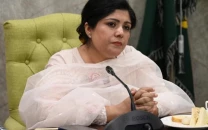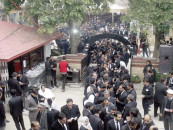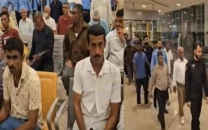Lack of controls letting hate speech flourish
Lawyers note that some words can lead to bones being broken with sticks and stone, if not worse

Students from Peshawar University protest to condemn the killing of Abdul Wali Khan university student Mashal Khan, after he was accused of blasphemy, during a protest in Peshawar, Pakistan. PHOTO: REUTERS
Legal experts said that growing hate speech is the biggest threat to Pakistani society as it has become a source of violence. There is a dire need to initiate a debate on these issues, they unanimously said.
They explained that there is lack of awareness in the masses regarding hate crimes and their implications. It is also unfortunate that the political leadership is not paying heed to the growing menace, though the National Action Plan clearly states that hate speech will be curbed. No effective mechanism has been adopted for its implementation. Likewise, the Faizabad episode has also exposed the executive’s failure to overcome these evils.
Loss of control
Senior jurists say that there is a challenge for the state regarding how to put a check on the mindset that is promoting hate speech, particularly among the professions that have key roles in opinion making, such as the media, lawyers, and teachers.
They believe that the state has no plan to monitor them and find a balance between freedom of speech and hate speech.
Recently, Islamabad High Court judge Justice Shaukat Aziz Siddiqui urged Attorney General for Pakistan Ashtar Ausaf Ali to stop the issuance of fatwas (religious decrees), from mosques and madrassas.
According to Section 505 of the Pakistan Penal Code; “Whoever makes, publishes or circulates any statement or report containing rumours or alarming news with the intent to create or promote…on grounds of religion…or any other ground whatsoever, feelings of enmity, hatred or ill-will between different religious, racial, language or regional groups or castes or communities” shall be punished with imprisonment for a term which may extend to seven years and with fine.
Ahsan Iqbal calls hate speech against minorities in National Assembly ‘tragic’
Pakistan Bar Council executive member Raheel Kamran Sheikh believes that there is dire need to start a dialogue to define ‘hate crimes’ and determine its parameters, adding that section 505 PPC is also required further interpretation.
Sheikh also stated that the superior judiciary should be alert that those who have a particular mindset of hate, should not be elevated as high court judges, adding that if they have been appointed then this aspect should be gauged before their confirmation. Likewise, he said that it is also a testing time for regulatory bodies of lawyers and journalists as they should strictly monitor the tendency of violence among their respective members.
A senior law officer, who is already working on these issues, believes that there is need to identify the causes of hate crimes first, adding that ignorance is the prime factor. “Those who are ignorant could easily be exploited.”
He also says that our society is deteriorating and intolerance is growing day by day. Likewise, there is no culture of study. However, the senior official says that force cannot overcome through force, rather, quality education should also be given to citizens.
Another stroke on the wall: Non-profit grabs brush to paint over hate graffiti across Karachi
Former SCBA Vice President Ikram Chaudhry further said that uncertainty is prevailing in society, while noting that a person who feels that someone is harming his reputation could register an FIR under PPC 503.
Lawyers also said that inducing someone to commit an offence is also a crime and law enforcement agencies are bound to proceed against the instigator as well.
On December 1, the Supreme Court in its order in the suo motu case regarding the Faizabad sit-in observed that no one can be allowed to use abusive language to advance a political agenda in the guise of a religious cause as it amounts to denigrating the religion. “Force and violence have no place in Islam. The word Islam itself means peace,” the bench noted.
It adds, “Those carrying out violent acts, advocating or propagating violence, destroying or damaging property, abusing, or resorting to hate speech also violate the injunctions of Islam.”
MQM’s Waseem Akhtar seeks bail in hate speech case
A believer cannot condone, let alone perpetuate violence, the order adds.
The order further says that it is a matter of grave concern when inflammatory, provocative or abusive statements are broadcast as they have the effect of fanning the flames.
“There are also those who are pushing out hateful propaganda. One wonders whether the violence that results and continues to express itself is a direct consequence of such broadcasts. Freedom of speech and expression and independence of the media is cherished by the people of Pakistan and guaranteed under the Constitution, but there is no place in the public discourse to propagate the commission of an offence or to incite people to resort to violence. Broadcasts cannot encourage violence, extremism, militancy, or hatred,” the order said.



















COMMENTS
Comments are moderated and generally will be posted if they are on-topic and not abusive.
For more information, please see our Comments FAQ